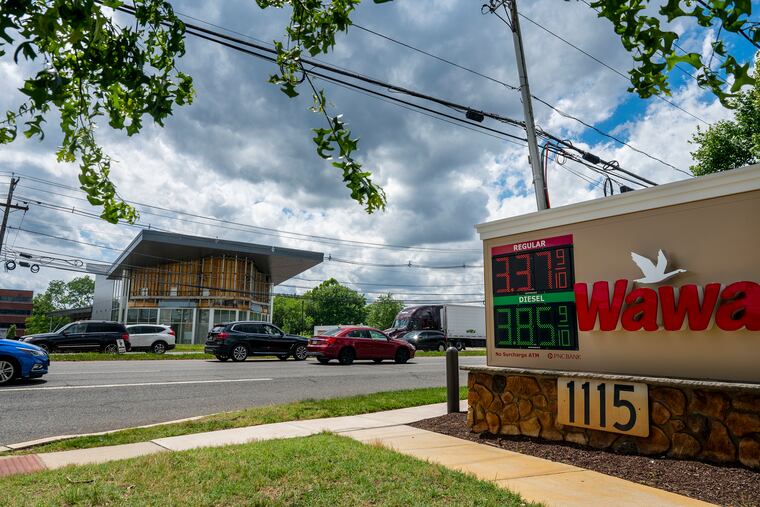Investor buys N.J. billboard sites to settle $28 million Catalyst debt; towns hope for improvements
W.P. Carey expects developers will seek to finish stalled projects in Mount Laurel and fix a decayed Pennsauken landmark sign, among others.

W.P. Carey Inc., the New York-based corporate real estate investor that financed a string of outdoor-advertising projects for Philadelphia-area billboard developer Catalyst, has taken control of nine of the company’s New Jersey sites, and is looking for developers to finish and manage them.
Catalyst owed Carey $28 million, including $26 million personally guaranteed by Catalyst founder Thaddeus Bartkowski, according to a lawsuit the investment firm filed last year.
The dispute was resolved with an auction sale Thursday, in which Carey took control of the sites at nominal cost, an outcome Bartkowski and other observers had predicted was likely.
Another Catalyst creditor, Meridian Bank of Exton, which Catalyst owed $23.5 million as of last year, has reduced its debt by taking control of and selling other Catalyst signs in Philadelphia and Langhorne. Meridian is seeking a Bucks County sheriff’s sale of the landmark, Catalyst-built, Quakertown Compass Monument and plans to pursue other sales of Catalyst developments in Southeastern Pennsylvania, according to the bank.
More than 40 would-be buyers had asked for details of the New Jersey billboard sites, according to Joshua Olshin, managing partner at New York-based Auction Advisers, which ran the sale. About two dozen showed up at a Princeton law office for the auction.
But conditions placed on the sale — that a buyer had to honor agreements with local communities before finishing or redeveloping the billboard plans — made Carey the most likely buyer: as Catalyst’s creditor, and a profitable, national company, Carey had a special interest in controlling the properties, and the financial strength to carry them on its books for a time, while helping potential developers negotiate updated plans with local communities, according to people who monitored and participated in the sale.
“We did generate a lot of interest. It is a complex situation,” Olshin said.
Some of the signs sold have been completed; others are as-yet unbuilt. A completed Pennsauken sign, including a pond, “green wall” and fountains, had fallen into disrepair, while a display incorporating a two-story ambulance station in Mount Laurel and an interactive sign wall marking the entrance to Flemington were left incomplete during yearslong legal and financial disputes.
The sale also included signs or sites in Merchantville, Washington Township (Gloucester County), and a second Flemington-area location.
Mount Laurel officials hope a developer will negotiate to finish the building Catalyst started to include an ambulance station, public areas, and signage on busy Route 73, said George Morris, an attorney for the township who has been watching the sale closely.
Catalyst started that project, but work stopped when contractors complained they weren’t being paid — a situation that has overtaken other Catalyst projects as the company struggled with creditors
Morris said potential plans for two other Catalyst sites in the township, which have not yet been developed, are also of interest.
Pennsauken officials have said they, too, look forward to a new owner’s repair and maintenance plans for a sign on busy Route 70 in the township’s southern section, where Catalyst-designed ponds and fountains have dried up and pieces of a dead “green wall” have fallen off the board. Even so, national billboard manager Outfront continues to sell and flash images from the board’s interactive screens.
Carey officials said it was early to set a timetable for redeveloping the properties. “Stay tuned,” said Gino Sabatini, head of investments for the real estate company.
For his part, Bartkowski has said he continues to scout and develop outdoor display sites in Philadelphia for eventual sale to national companies. He faces new competition from three of his former business partners, ex-Catalyst officials Patrick Wolfington, John Grabowski, and Timothy Earle: an injunction enjoining the trio from seeking business in the Philadelphia area was lifted July 2 by Chester County Common Pleas Court Judge Bret Binder.
The trio allege in a lawsuit they filed soon after they left Catalyst in 2021 that Bartkowski’s personal spending from company funds left Catalyst unable to pay vendors; Bartkowski has blamed a slowdown in the billboard business during the COVID shutdowns, as well as Carey’s unwillingness to ease its payment terms.
Both Bartkowski and the three ex-Catalyst partners say the other owes them money; the dispute is scheduled for trial before Judge Binder in September.